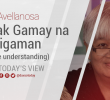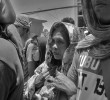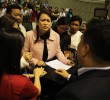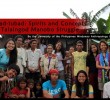BY BENJIE OLIVEROS
Bulatlat
ANALYSIS
Vol. VII, No. 15 May 20-26, 2007
�Generally peaceful� � this is how the Commission on Elections (Comelec) and the Philippine National Police (PNP) described with elation the May 2007 elections this week. PNP Director General Oscar Calderon based the agency�s assessment on the number of cases of electoral violence recorded this year. Unlike in 2004 when 189 people were killed and 270 were wounded in 249 election-rated cases of violence, Calderon said, only 127 people were killed and at least 130 wounded in the recent elections. Those killed included 61 politicians and candidates.
The Comelec on the other hand said that the projected turnout of 75 to 80 percent showed that the elections were successful. Comelec Chairperson Benjamin Abalos, Sr. added that in 2004, there were more places where elections were suspended compared to this year.
But a recently-concluded People�s International Observers Mission (People�s IOM) saw otherwise. The mission, composed of 27 foreign observers, recorded several cases of election violations from the most minor, such as distributing sample ballots near polling precincts to the most serious, such as poll watchers coaching voters who to vote, passing on ball pens to voters with names of candidates pasted on it, to vote buying and multiple voting. They were able to take the picture of a woman in Lanao del Sur with two fingers smeared by indelible ink, indicating that she voted more than once. Likewise, the foreign observers were able to interview a candidate who admitted to buying votes saying that he would not win if he did otherwise.
These may seem exaggerated to voters where local elections were relatively benign. But in Lanao del Sur, the People�s IOM saw total chaos. And what were the Comelec officials doing there? They were either absent from the polling place or abdicated on their duty and responsibility of trying to restore order in the voting.
Absent, incompetent, too intimidated
Comelec officials were either suspiciously absent or incompetent, or too intimidated to act. Not far from Quezon City, in Makati, Ephraim Genuino, president of PAGCOR, administration ally and father of two candidates – one for congressman and another for councilor, also in Makati � entered the city canvassing area with two armed bodyguards.
The People�s IOM also documented the heavy presence of military troops and armed police officers roaming around and inside polling precincts and canvassing areas. And contrary to the claim of Presidential spokesperson Ignacio Bunye that the presence of soldiers made voters more secure, it created an intimidating presence especially for those who planned to vote for party-lists and candidates the military was campaigning against.
More often than not, the military, police, and even barangay officials were reported to be in cahoots with the dominant political dynasty in the area. In Nueva Ecija, the Josons reportedly intimidated the poll watchers of their competitors and that of progressive party-list groups. When the people protested against cases of electoral fraud, the military barricaded the municipal hall. There were soldiers in Lanao del Sur but this did not prevent elections from going astray in the province.
There was also an apparent deliberate disenfranchisement of voters, especially those identified with progressive party-list groups. This is aside from what the People�s IOM called as a new type of disenfranchisement – instilling fear. The military conducted an aggressive campaign against progressive party-lists, warning people that their vote for theses groups would be seen as support for the New People�s Army (NPA). Two poll watchers of Kabataan (Youth) party were abducted and slain.
Culture and politics
In refuting the findings of international observers, the Macapagal-Arroyo administration claimed that foreigners are not familiar with the culture and politics of Filipinos and that their exposure is too limited to arrive at conclusions.
But is it not an insult to Filipinos to say that electoral fraud and violence is an inherent part of our culture and politics? And no matter how limited was their stay in the Philippines didn�t what the foreign observers see and document enough to confirm the cycle of fraud and violence haunting Philippine elections?
The Comelec said that there were fewer areas where there was a failure of elections. But isn�t it enough to say otherwise when there were several cases of fraud documented by two international observers� groups from different regions in the country from north to south?
The Macapagal-Arroyo administration claimed that there were fewer killings now than in 2004. But should we be content with having less dead bodies? Aren�t the rampant killings a problem enough? Furthermore, if the number of those killed among members of progressive party-list groups are added, the figure for 2007 would be much higher.
Electoral fraud and violence are not integral to Philippine culture and politics. It is created by those who benefit from the existing system of Philippine politics and governance.
The Macapagal-Arroyo administration used the same institutions, the Comelec and the Armed Forces of the Philippines, the same machinery, and the same methods that it utilized in 2004. This explains the 12-0 vote in Maguindano.
But in spite of the fraud and massive vote buying, violence and intimidation, the opposition and progressive party-list groups are still winning and political dynasties are being defeated in some regions. This cannot be credited to honest and orderly elections. It can only be credited to the Filipino people. Against all odds, they still were able to make their voices heard. But Filipinos still deserve something better. Bulatlat
2007 Elections
![[STANDPOINT] Illegal drugs and the NIMBY mindset](https://davaotoday.com/wp-content/uploads/2016/09/Mags-Maglana_UPMIN-Sept.-20-110x100.jpg)








